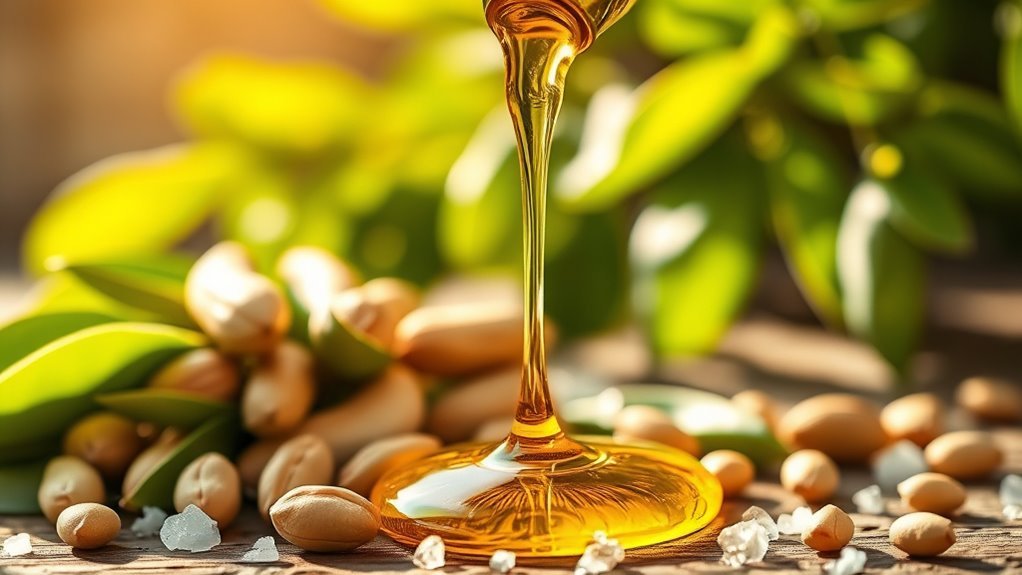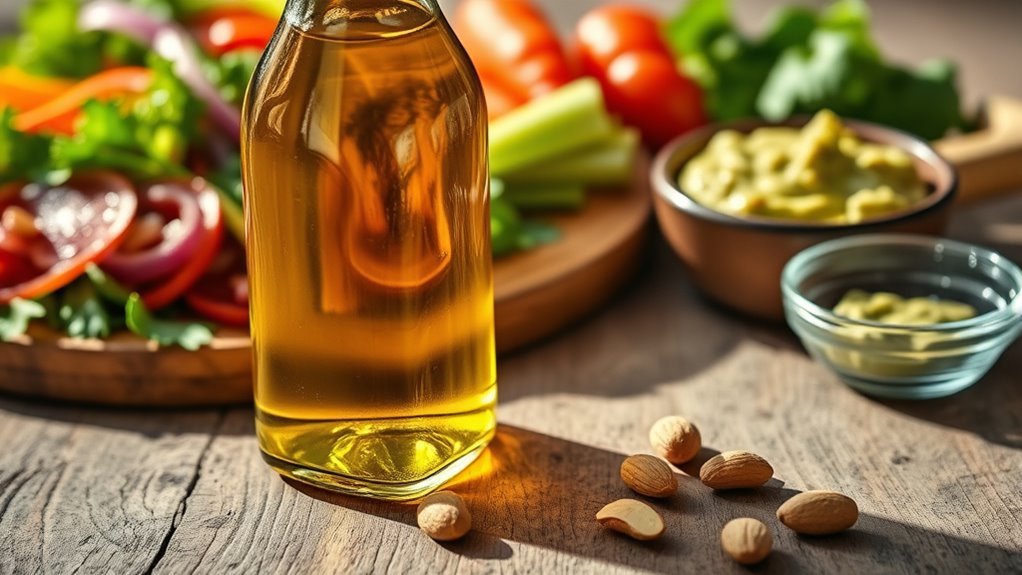Yes, peanut oil is keto-friendly! It contains healthy fats and virtually no carbs, making it suitable for a ketogenic diet. Its high smoke point of 450°F makes it versatile for various cooking methods. While it enhances flavor and supports nutrient intake, moderation is essential due to its calorie density. Keep in mind potential allergy risks as well. Want to know more about how to incorporate peanut oil into your meals? There’s plenty more to explore!
Understanding Peanut Oil’s Nutritional Profile

Peanut oil, often found in kitchens around the world, has a unique nutritional profile that can be intriguing for those following a keto diet. This oil is primarily composed of healthy fats, particularly monounsaturated and polyunsaturated fatty acids, which can offer significant nutritional benefits. It contains vitamin E, an antioxidant that supports immune function and skin health. When you use peanut oil for cooking, you’re not only enhancing flavor but also potentially improving your nutrient intake. However, it’s important to keep in mind that peanut oil is still calorie-dense, so moderation is key. Incorporating this oil into your meals can align with your keto goals, provided you’re mindful of your overall fat intake and dietary balance.
The Role of Fats in a Ketogenic Diet

Fats play a pivotal role in a ketogenic diet, serving as the primary source of energy when carbohydrate intake is considerably reduced. Understanding fats’ importance isn’t just about calories; it’s about choosing the right fat sources to optimize your health.
Here’s a quick overview of healthy fat sources:
| Fat Source | Benefits |
|---|---|
| Avocado | Rich in monounsaturated fats, supports heart health. |
| Olive Oil | High in antioxidants, beneficial for inflammation. |
| Coconut Oil | Contains medium-chain triglycerides, boosts energy. |
| Nut Butters | Good source of protein and essential nutrients. |
Incorporating these fats can help you maintain energy levels while enjoying the freedom of diverse meals in your ketogenic journey.
Peanut Oil’s Carb Content and Keto Compatibility

What makes peanut oil a deliberation for your ketogenic diet? Peanut oil is low in carbohydrates, with virtually no carbs per serving, making it a suitable choice for maintaining ketosis. It’s primarily composed of healthy fats, which is essential for fueling your body on a keto diet. This oil has a high smoke point, making it versatile for various cooking methods. However, it’s important to evaluate allergies and individual dietary preferences, as peanut oil may not suit everyone. While it offers a favorable fat profile, moderation is key, as with any oil. Ultimately, when used thoughtfully, peanut oil can fit seamlessly into your keto lifestyle, giving you the freedom to enjoy diverse flavors in your meals.
Comparing Peanut Oil to Other Cooking Oils
While exploring cooking oils for your ketogenic diet, it’s essential to evaluate how peanut oil stacks up against other popular options. Peanut oil has a high smoke point, making it versatile, but how does it compare to others?
Here’s a quick overview of some cooking oils:
| Oil | Smoke Point | Fat Composition |
|---|---|---|
| Peanut Oil | 450°F | High in polyunsaturated fats |
| Olive Oil | 375°F | High in monounsaturated fats |
| Coconut Oil | 350°F | High in saturated fats |
| Avocado Oil | 520°F | High in monounsaturated fats |
| Canola Oil | 400°F | Balanced fats |
Each oil has its unique benefits and uses. From peanut oil’s high smoke point to the heart-healthy fats in olive and avocado oils, choosing the right one can enhance your cooking experience.
Health Benefits and Drawbacks of Peanut Oil
When considering peanut oil, it’s important to look at its nutritional profile, which includes healthy fats and some essential vitamins. However, you should also be aware of the potential for allergic reactions, especially if you or someone you cook for has a peanut allergy. Balancing these factors can help you make an informed choice about using peanut oil in your diet.
Nutritional Profile Overview
Although peanut oil is often praised for its unique flavor and versatility in cooking, understanding its nutritional profile is essential to determine its place in a keto diet. Peanut oil is primarily composed of monounsaturated and polyunsaturated fatty acids, which can be beneficial for heart health. However, it’s relatively low in nutrient density compared to other oils, like olive or avocado oil. While it provides some vitamin E, its overall micronutrient content isn’t particularly impressive. On a keto diet, the importance of healthy fats cannot be overstated, so considering the balance of fatty acids and their effects on your body is vital. Ultimately, you’ll want to weigh the benefits against the drawbacks to see if peanut oil aligns with your dietary goals.
Potential Allergic Reactions
Peanut oil’s culinary versatility and potential health benefits come with some considerations, particularly regarding allergic reactions. If you have food allergies or peanut sensitivity, using peanut oil can trigger allergy symptoms like hives, swelling, or even anaphylaxis. It’s vital to be mindful of cross-contamination when cooking; even trace amounts of peanut oil can pose a risk. For those following dietary restrictions, always check labels to verify safety. While peanut oil is generally safe for many, its use in your kitchen should involve careful consideration of your personal health history. Cooking safety is paramount, so whether you’re frying or sautéing, understanding your body’s responses to peanut oil will help you enjoy its benefits without compromising your well-being.
Cooking Techniques and Uses for Peanut Oil
While you might be exploring various cooking oils for your keto diet, peanut oil stands out due to its high smoke point and versatility in the kitchen. This oil is perfect for frying techniques, allowing you to achieve crispy textures without burning. Its neutral flavor profile complements a wide range of dishes, from stir-fries to marinades. You can also use peanut oil for sautéing vegetables or drizzling over salads to enhance their taste. Whether you’re deep-frying chicken or frying tofu, this oil holds up well under high heat, making it a reliable choice. Plus, its unique flavor can add a delightful twist to your keto meals, giving you the freedom to experiment with different cuisines.
Potential Allergies and Considerations
When considering peanut oil for your keto diet, it is vital to be aware of potential allergies and health considerations. Peanut allergies are among the most common food allergies, and symptoms can range from mild hives to severe anaphylaxis. If you or someone you cook for has a peanut allergy, avoiding peanut oil is imperative. Additionally, cross reactivity issues may arise; for instance, individuals allergic to tree nuts might experience allergic reactions to peanuts as well. It’s important to be vigilant about reading labels, as peanut oil can be present in unexpected products. If you’re uncertain, consulting with a healthcare professional can help guarantee you make safe dietary choices while enjoying the freedom of a keto lifestyle.
Making the Best Choices for Your Keto Journey
As you begin your keto journey, making informed choices about the oils and fats you incorporate into your diet can greatly impact your health and success. Effective keto meal planning hinges on understanding oil selection strategies. Here are some tips to guide you:
Making informed choices about oils and fats is essential for a successful keto journey.
- Opt for healthy fats: Use avocado oil and olive oil—they’re rich in monounsaturated fats and beneficial for heart health.
- Avoid processed oils: Stay away from vegetable and seed oils that can contain unhealthy trans fats.
- Experiment with flavors: Try coconut oil for a sweet touch or ghee for a rich, buttery flavor in your dishes.
Balancing your oil choices can enhance your meals while keeping you aligned with your keto goals. Make these selections wisely for a fulfilling, liberating experience!
Frequently Asked Questions
Can Peanut Oil Help With Weight Loss on Keto?
When considering if peanut oil can help with weight loss on keto, it’s essential to look at its nutritional profile. Peanut oil is high in monounsaturated fats, which can support your keto benefits by promoting satiety and reducing cravings. However, moderation’s key, as excess calories can hinder weight loss. Incorporating peanut oil thoughtfully into your meals might enhance flavor while keeping you aligned with your keto goals, but balance is vital for ideal results.
Is Peanut Oil Suitable for High-Heat Cooking?
Peanut oil’s great for high-heat cooking due to its high heat stability and impressive smoke point of around 450°F. This means it won’t break down easily when subjected to high temperatures, making it ideal for frying and sautéing. Plus, its mild flavor won’t overpower your dishes. Just be mindful of any allergies and your overall dietary preferences. Using peanut oil can give you the freedom to explore diverse cooking techniques while enjoying delicious meals.
How Does Peanut Oil Impact Cholesterol Levels?
Imagine your heart as a finely tuned engine, where cholesterol types play a vital role in its performance. Peanut oil, rich in monounsaturated fats, can help improve your heart health by raising good HDL cholesterol while potentially lowering bad LDL cholesterol. However, moderation’s key—too much of even a healthy fat can tip the balance. So, embrace peanut oil wisely, and your heart will thank you for it!
Can I Mix Peanut Oil With Other Oils?
You can definitely mix peanut oil with other oils for various health benefits. Combining oils like olive or avocado oil can enhance flavor and nutritional value, as each oil has unique properties. For instance, peanut oil has a high smoke point, making it great for frying, while olive oil offers heart-healthy fats. Just be mindful of the oil combinations you choose, as balancing flavors and health profiles can lead to better culinary results.
Is Refined or Unrefined Peanut Oil Better for Keto?
When you think of oils, imagine a dance of flavors in your kitchen. Refined peanut oil shines with refined benefits, boasting a high smoke point and neutral taste, perfect for cooking at high temperatures. However, unrefined peanut oil carries unrefined drawbacks—its lower smoke point can lead to burning and a stronger flavor that might not suit every dish. Ultimately, your choice depends on your cooking style and flavor preferences.
1. Is peanut oil considered keto-friendly?
Yes, peanut oil is considered keto-friendly. It is high in fat and low in carbohydrates, making it suitable for those following a ketogenic diet. With approximately 120 calories and 14 grams of fat per tablespoon, peanut oil aligns well with the high-fat requirements of a keto diet.
2. What are the health benefits of using peanut oil on a keto diet?
Peanut oil contains healthy fats, including monounsaturated and polyunsaturated fats, which can help improve heart health and lower bad cholesterol levels. It also provides vitamin E, an antioxidant that supports skin health and may reduce inflammation. These benefits can complement a keto diet, which emphasizes healthy fat consumption.
3. Can peanut oil be used for cooking at high temperatures on a keto diet?
Yes, peanut oil has a high smoke point of around 450°F (232°C), making it suitable for frying, sautéing, and other high-temperature cooking methods. This property allows you to use peanut oil in various recipes while adhering to your keto diet without worrying about the oil breaking down.
4. Are there any drawbacks to using peanut oil on a keto diet?
While peanut oil is generally safe for most people, it may cause allergic reactions in individuals with peanut allergies. Additionally, it is important to consider the omega-6 fatty acid content in peanut oil, which can be pro-inflammatory if consumed excessively. Moderation is key, and incorporating a variety of healthy fats is recommended for a balanced keto diet.
5. How does peanut oil compare to other oils for a keto diet?
Peanut oil is comparable to other oils like olive oil and avocado oil in terms of its fat content. However, it has a different flavor profile, which may be preferred in certain dishes. While olive oil is rich in monounsaturated fats, peanut oil is a good source of both monounsaturated and polyunsaturated fats. Choosing the right oil can depend on the specific cooking method and flavor desired, but peanut oil remains a viable option for keto dieters.
References
- https://www.healthline.com/nutrition/keto-diet-foods#fats
- https://www.ncbi.nlm.nih.gov/pmc/articles/PMC6835745/
- https://www.medicalnewstoday.com/articles/325345
- https://www.webmd.com/diet/obesity/features/keto-diet
- https://www.dietitians.ca/Your-Health/Healthy-Eating/How-to-Start-the-Keto-Diet
- https://www.mayoclinic.org/healthy-lifestyle/nutrition-and-healthy-eating/expert-answers/keto-diet/faq-20458035
- https://www.verywellfit.com/keto-diet-food-list-5114192
- https://www.nutrition.gov/topics/nutrition-101/fats


